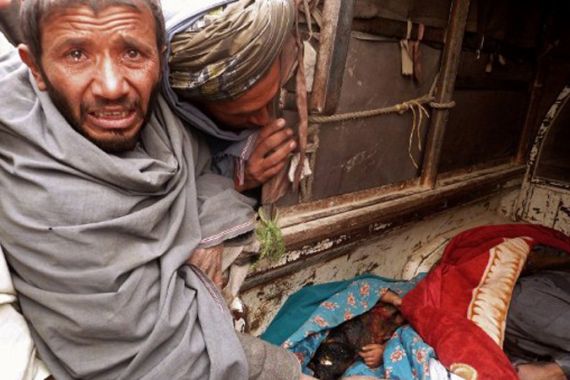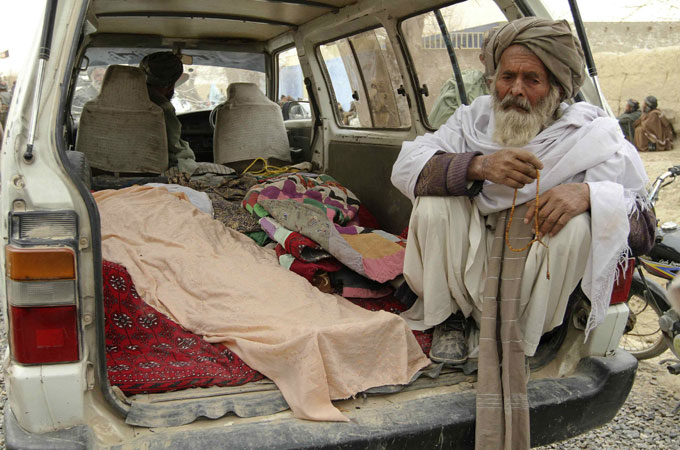Mass murder in Kandahar
US soldier who killed civilians during shooting spree faced no resistance because residents are now used to night raids.

 |
| Some of the bodies of the victims were badly burned, but it remains unclear whether the fire in this Kandahar home was set deliberately or caused by the shooting itself [AFP] |
Kabul, Afghanistan – As the 16 civilian victims of a US sergeant’s shooting spree in southern Afghanistan are buried, new details of the horrific episode are emerging. Nine of those killed were children. Three were women.
The residents of Panjwai district in the volatile Kandahar province said they showed no resistance during the mass murder – because they have become used to regular night raids by both foreign and Afghan forces.
“We have learned that our houses will be searched at night, and we just cooperate,” one resident told Al Jazeera.
“Earlier in the night, there had been helicopters hovering over the district, and people had prepared for night raids – for their houses to be searched,” Abdul Rahim Ayoubi, a member of parliament from Kandahar, told Al Jazeera.
Panjawi resident Gul Bashra told the Associated Press: “Americans are always threatening us with dogs and helicopters during night raids.”
Hamid Karzai, the Afghan president, was briefed about the shooting – which happened in the early hours of the morning, with accounts suggesting as early as 2am local time – during his breakfast, said an official in his national security team. The palace did not know of the exact number of casualties, so the president dispatched an investigating team to the district, before leaving to address a gathering to belatedly mark International Women’s Day.
The sergeant entered three homes in two villages, one to the north and another to the south of the military base, Haji Agha Lalai Dastagiri, a member of the president’s investigating team, told Al Jazeera. Dastagiri was originally from Panjwai district, and has led the Kandahar provincial council since the assassination of Ahmad Wali Karzai.
The villages are roughly two to three kilometres apart.
“From his footprints, we could tell he had tried to kick open the gates of many houses, but had failed. He had finally found one gate open,” said Dastagiri.
The sergeant killed eleven members of that household, but information as to the exact sequence of events remains conflicted. Dastagiri said the soldier had gathered his victims in one room and opened fire.
Ayoubi, the politician, said the sergeant had opened fire as the victims were sleeping in their beds.
“The children had one bullet in their heads each, as if it was a well-planned execution,” a senior government official told Al Jazeera on condition of anonymity.
The soldier, who reportedly has two children of his own, was laughing as he opened fire, one of the six who survived their wounds told the official when he visited the hospital.
“In the house that he killed eleven people, some of the victims were burned. It is unclear whether he deliberately set them on fire, or the blankets caught fire from the bullets,” Ayoubi said.
‘Dangerous silence’
The soldier then continued his rampage to a village to the south of the small military base, killing five – in some accounts six – people in two separate homes.
“Some people are saying it could not have been the work of one soldier,” said Ayoubi. “The villages are about four kilometres apart. And the bases are protected by cameras, they have security procedures, how does one soldier walk out like that? It is not as if we are talking about the illiterate, untrained Afghan army. This is supposed to to be the best army in the world.”
But Dastagiri, who visited the cites as part of the initial investigation, found no evidence to suggest the involvement of more than one person.
 |
| An elderly Afghan man sits next to the shrouded bodies of relatives [REUTERS] |
“He [the shooter] had tried to come back to his base – which is a joint base with Afghan army.The Afghan soldiers were surprised to see a lone US soldier walking in that time of the morning, so they had taken his weapon,” Dastagiri said.
“If he had entered the way he had left, no one would have known who killed all those people.”
The NATO-led international coalition was swift in its condemnation, releasing multiple statements, pledging a rapid and thorough investigation.
But the incident, coming after weeks of anger over US soldiers burning copies of the Quran, has made things difficult for two men in particular: President Karzai and General John Allen, the US commander of NATO forces in Afghanistan.
At least 41 Afghans died in the country-wide protests against the Quran burning. Six foreign soldiers were also shot by their Afghan counterparts, believed to be angered by the Quran burning incident.
Karzai has been outspoken against civilian casualties and has repeatedly demanded an end to night raids.
He remained on the phone to people in Panjwai all day, speaking to elders and victims’ families, said Karzai’s aides.
“You always talk about ending the night raids, but aren’t you ashamed that you haven’t done anything?” one Panjwai elder told the president over the phone, a national security council official told Al Jazeera.
The US embassy in Kabul sent out an alert to its citizens, cautioning that as a result of the shooting “there is a risk of anti-American feelings and protests in coming days”.
But Panjwai remained calm, overwhelmed by its grief.
“Our silence is dangerous,” said Ayoubi, who was meeting with elders all day in Kandahar. “On the one hand, we no longer know who to complain to. The Taliban kill us, the international forces kills, and the government is helpless. There is no door left for us to knock on anymore,” .
“I asked the elders here, why no demonstrations, no outcry? They say they are silent because they want to deliberate their moves, they want to decide. And once they decide, there will be no army, no force that can stop them. Sixteen were martyred, but they will give 80 lives, so another 20 can live in dignity.”
Reporting by Qais Azimy in Kabul, Afghanistan and Mujib Mashal in Doha, Qatar.